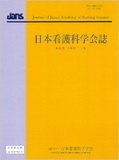Japanese
English
- 販売していません
- Abstract 文献概要
- 参考文献 Reference
要旨
目的:抗がん剤変更時における高齢消化器がん患者のフレイルの実態とQOLの関連を明らかにすることである.
方法:抗がん剤変更時の65歳以上の消化器がん患者を対象に横断的観察研究を行った.フレイル及びQOLの測定は,G8とEQ-5D-5Lを用いた.
結果:51名が研究参加を同意し,データ収集と分析を行った.フレイルに該当する高齢消化器がん患者は,40名(78.4%)であった.フレイルには,BMI(p < .001),下腿三頭筋周囲径(p = .023)が関連していた.また,フレイル群は非フレイル群に比べQOLが低かった(p = .04).
結論:抗がん剤変更時における高齢消化器がんのフレイル患者の特徴とフレイルサイクルへ陥りやすい集団が明らかになった.治療変更時における高齢がん患者に対するフレイルの評価は,QOLを考慮した個別的な支援の重要な要素になり得る.
Aim: The study aimed to investigate the relationship between frailty and quality of life (QOL) in older patients with gastrointestinal cancer at the time when an anticancer drug regimen is changed.
Methods: We conducted a cross-sectional observational study of gastrointestinal cancer patients aged 65 years or older at the time of anticancer drug change. Frailty and QOL were measured using G8 and EQ-5D-5L.
Results: Fifty-one patients agreed to participate in this study. Data collection and analysis were conducted. Forty (78.4%) older patients with gastrointestinal cancer were considered frail. Flail group had a lower BMI (p < .001), thinner calf (p = .023), and lower quality of life (p = .04) compared to the non-frail group.
Conclusion: This study showed the characteristics of frail patients with gastrointestinal cancer when changing anticancer drug regimen and the population that is vulnerable to falling into the frail cycle. The assessment of frailty in older cancer patients receiving anticancer drugs was an essential factor for QOL-conscious treatment decision.
Copyright © 2022, Japan Academy of Nursing Science. All rights reserved.


